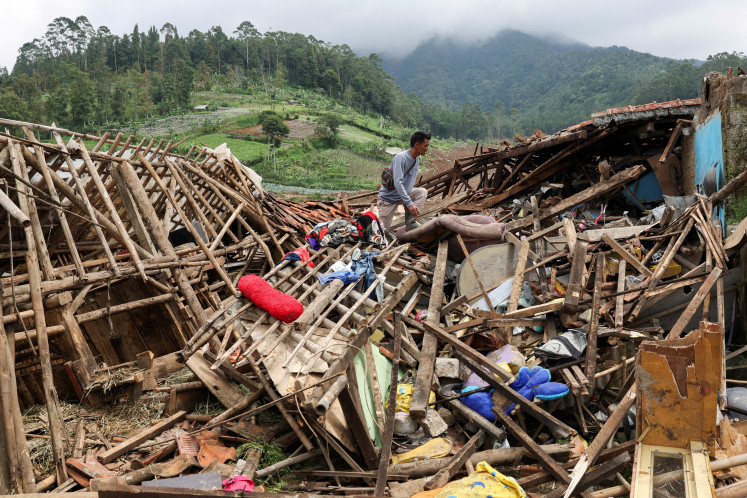Popular Reads
Top Results
Can't find what you're looking for?
View all search resultsPopular Reads
Top Results
Can't find what you're looking for?
View all search resultsDemocracy and the `remilitarization' of the TNI
Is democracy hurting Indonesia's defense? One cannot but ponder this unspoken, yet often privately asked, question heard recently in a public discussion organized by noted military watchdog the Pro-Patria Institute
Change text size
Gift Premium Articles
to Anyone
I
s democracy hurting Indonesia's defense? One cannot but ponder this unspoken, yet often privately asked, question heard recently in a public discussion organized by noted military watchdog the Pro-Patria Institute.
While the forum was meant to launch the institute's latest recommendations on national security, discussions during the Q&A session touched on the "excesses" of democracy and how it has complicated, if not undermined, the Indonesian Military's (TNI) efforts to strengthen national defense.
They addressed, for example, how democracy had contributed to the increasing fragmentation of Indonesia, and how the media's growing strength "hindered crucial legislations like the state secrecy bill" - not to mention the public outcries that ensue every time the Defense Ministry proposes solutions (amidst its limited budget) that include expanding territorial commands or imposing a national draft.
These lamentations are certainly not without merit. But they also underline the fact that finding equilibrium between maintaining a democratic administration and establishing national defense will never be straightforward - especially in the absence of a clear roadmap from the government while national security-related bills have been stalled.
If, however, we could agree that any military transformation agenda should ultimately "remilitarize" the TNI and improve its overall effectiveness and professionalism, then preserving Indonesia's democracy, regardless of its deviations, would be in the long-term interest of the TNI.
First, democracy could, in the long-run, wear down the prevalent patron-client relationship - often dubbed "bapakisme" - that has characterized our military culture for so long and complicated internal military reforms.
This could be done by instilling a sense of egalitarian individualism and comradeship - both spillovers from a democratic society - within the ranks, where soldiers are willing to fight, not for a personal patron or party, but for a popularly-elected and legitimate government. This would ultimately create more dedicated, better skilled and better led soldiers.
Separate studies conducted by historian Victor Davis Hanson and political scientists Dan Reiter and Allan Stam conclude that this "democratic culture" is one of the main reasons why democracies win nearly all wars they start, and about two-thirds of wars in which they are targeted. Their average success rate is 76 percent.
Second, democracy could further support and improve the modernization of the military. This is because democracy could improve our economy further, since it allows for better relations with the world market, boosting domestic growth. Eventually, more resources would be available to increase the defense budget. Clearly, increasing defense spending is among the most important factors in the modernization of Indonesia's military.
Economic openness and better relations with major powers could also further our defense relations. This would eventually enable us to better tap into the globalization of defense industries and increase collaborative programs and cooperation with major countries like India, the US, Britain, Japan, and South Korea.
Deeper relations with these countries could also, ultimately, strengthen our domestic defense industrial base, and even open new sources of military aid. The lifting of the US embargo on Foreign Military Financing and International Military Education and Training in 2005-2006 is a case in point.
Third, democracy could further optimize our defense planning. Since political leaders are elected democratically, and therefore held accountable, they have added impetus to be rational in allocating their scarce resources. Reforming defense management practices is thus inevitable if they wish to direct more resources into popular policies to ensure their own re-election.
Democratic openness could further boost our fledgling civilian defense community. This in turn would provide critical input and out-of-the-box thinking needed by the Defense Ministry to better manage its resources.
Thus, we would eventually see material assets or defense resources better calibrated and optimized, resulting in an overall improvement of defense management and subsequent force employment - which military scholar Stephen Biddle pointed out is crucial to generate operational and tactical effectiveness.
Finally, democracy could further boost the TNI's institutional morale, which historically has been tied to the degree of internal transparency in manpower issues (such as salaries and promotions) and the degree of their "unity", or public standing, with the Indonesian people.
During Soeharto's 32-year reign, the military was seen more as a regime tool for the president and his cronies. However, the lack of internal transparency had given rise to a sense of frustration within the ranks, especially among those without political connections, and eventually fragmented the high command. The democracy that followed Soeharto's demise reversed these trends.
Military watchdogs and the parliament have pushed for greater internal transparency and better welfare for the troops. A merit-based system is slowly being introduced, the defense budget has quadrupled in the past decade, and salaries have increased significantly.
Furthermore, democracy has also restored the TNI's image, as internal reforms began to be carried out by reformist officers. Polls conducted by Kompas have shown that the TNI's public standing improved from a low point of 24 percent favorability in 1999, to 64 percent in 2005.
Ultimately, those who think our democracy should be "limited" or reversed because it is hurting our national defense should remember that free men fighting for their freedom often make the best soldiers - as our own history has testified.
The writer is a researcher at the Centre for Strategic and International Studies, Jakarta.










